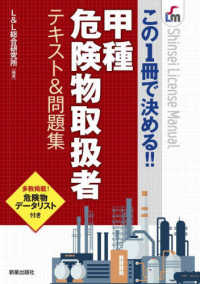Full Description
This book offers a unique discursive perspective on the rapid rise of food charity and how food poverty has emerged as a symptom of deeper problems requiring psychological intervention.
Christian Möller explores how new anti-poverty programmes and advice cultures are psychologising poverty by locating causes and solutions inside the mind rather than in the outside world, and considers the political stakes in citizens becoming subjects of charity. Drawing extensively on Foucault alongside feminist and critical theory, the book puts forward an overdue challenge to the pervasive effects of a psychology, which limits our thinking about poverty with promises of development, happiness and resilience, but leaves social inequalities intact. Möller argues for returning critical psychology to praxis to address social injustices and inequalities. Challenging common assumptions about food charity as a symptom of a retreating welfare state, he shows how power is exercised and knowledge is produced in these spaces of care and community. Also featuring direct applications of concepts to the real-world example of food banks, the book helps set out practical guidance for students and researchers designing empirical projects in critical psychology.
Drawing on original research and interviews with managers and volunteers, this text is fascinating reading for students and academics interested in critical psychology, and the relationship between charity, poverty and social exclusion.
Contents
Introduction: An Essay in Refusal
'More than Food' and Behaviour Change
New Subjects of Charity
Toward a Critical Ontology of Food Charity and the Psychologisation of Poverty
Scope and Focus of the Book
The Dispositive of Food Charity
2.1. "What is a Dispositive?"
2.2. Fuelling the Machine: Flows and Materialisations of Knowledge
2.3. The Spectacle of Food Charity: Neighbourhood Food Collections (NFCs)
2.4. Collection Points: Consuming Charity
2.5. Feeding the Worthy Poor
2.6. Poverty Relief as Spectacle
2.7. Failures in Disposition and Possible Resistance
2.8. Conclusion
Problematisations of Food Poverty
Problematisations in Foucault
Constituting Problematic Subjects in the Food Bank
Problematisation 1: Food Poverty as Sudden Crisis Driven by Structural Factors
Problematisation 2: Food Poverty as Personal Chaos and Culture of Poverty
Problematisation 3: Food Poverty as Result of a Failing Society
Local Constructions of Food Poverty as a Social Problem
Conclusion
Crisis and the Medicalisation of Poverty
Crisis as Discourse: A Brief Genealogy
The Constitution of 'Clients in Crisis'
A Nudge in the Food Bank
Behavioural Activation and (not so) Soft Paternalism
Conclusion
'More Than Food'
'More Than Food'
"Eat Well - Spend Less"
Job Clubs and Social Spaces in Food Banks
Conclusion
The Psychopolitics of Food Charity
From Vulnerability to Wellbeing: Happy Subjects of Charity?
Disrupting the Spectacle and Killing Charity's Joy
Developing a Shockproof Subject?
Refusing Resilience, Positivity and Development
Conclusion
Concluding Reflections: From Refusal to Innovation
Psychology, 'Nudge' Economics and Neoliberalism
Liberalism and the Traps of Humanism
Absent Voices and Poverty Research
Essays in Refusal: The Value of Critique
Critique is Not Enough: From "What's to be done?" to "What more am I to do?"
References








